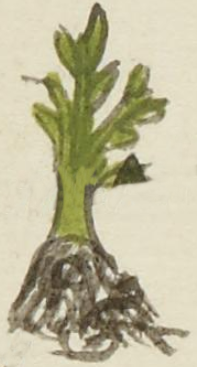Nentlamatoc (MH650r)
This compound glyph for the personal name Nentlamatoc (perhaps "He Became Unhappy") is a man's name. It shows an obscure man’s head in profile, facing toward the viewer’s right. This head is largely hidden in the roots of a plant. The plant appears above this head. It has multiple branches and stands up tall. The role of the plant remains unclear, but it may be a medicinal plant and, if so, it could be pointing to the -tlama- (healer) in the name. The -toc ending could also have something to do with being planted.
Stephanie Wood
This glyph and other ones from the Matrícula de Huexotzinco that refer to Nentlamatoc require further research.
If this name starts with Nen- if may have something to do with the five extra days in the calendar of 360 days (xiuhpohualli), which were called nemontemi (useless days). It was unlucky to be born on these days. A man who was born in this period was called nenoquich and a woman was called nencihuatl. This is explained in the Florentine Codex in Book 2, folio 12 recto (see: https://florentinecodex.getty.edu/book/2/folio/12r). These individuals were considered unlucky, ill-fated, and even useless. A great many individuals in the Matrícula de Huexotzinco have names beginning with the negative syllable Nen-. Perhaps they were born in that ill-fated period, or perhaps the negative syllable came to be even more liberally applied. With men, for instance, Nentequitl (perhaps a lazy worker) was much more common than Nenoquich. When presented visually, the nen- syllable could derive from nenetl (a figure or sculpture of a deity or a doll). Nenetl also had an association with women’s genitals, which has caused much speculation about a negativity associated with women and their sex, but that might have come from European religious influence. In the colonial context, such concepts and perceptions could easily become muddied.
Stephanie Wood
1560
Jeff Haskett-Wood
plantas, cabello, cabezas, guerra, guerreros, cautivos, dificultades, nombres de hombres

nentlamati, to be fretful, unhappy, https://nahuatl.wired-humanities.org/content/nentlamati
nen-, in vain, https://nahuatl.wired-humanities.org/content/nen
tlama, surgeon, physician, https://nahuatl.wired-humanities.org/content/tlama-1
toca, to plant, https://nahuatl.wired-humanities.org/content/toca
-toc, went to do, https://nahuatl.wired-humanities.org/content/toc
Stephanie Wood
Matrícula de Huexotzinco, folio 650r, World Digital Library, https://www.loc.gov/resource/gdcwdl.wdl_15282/?sp=382.
This manuscript is hosted by the Library of Congress and the World Digital Library; used here with the Creative Commons, “Attribution-NonCommercial-ShareAlike 3.0 License” (CC-BY-NC-SAq 3.0).




